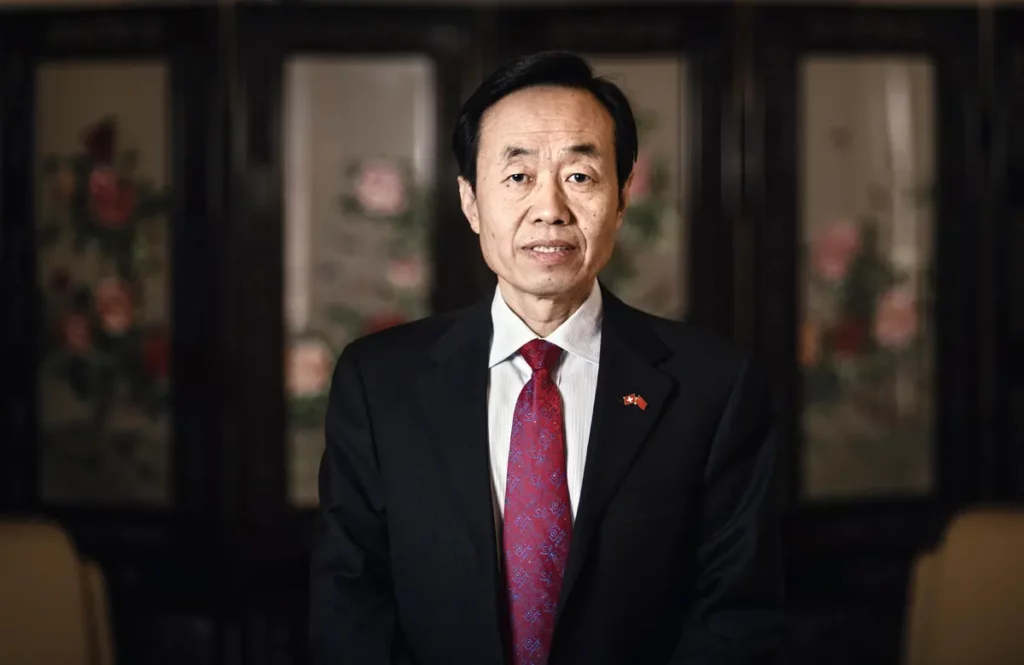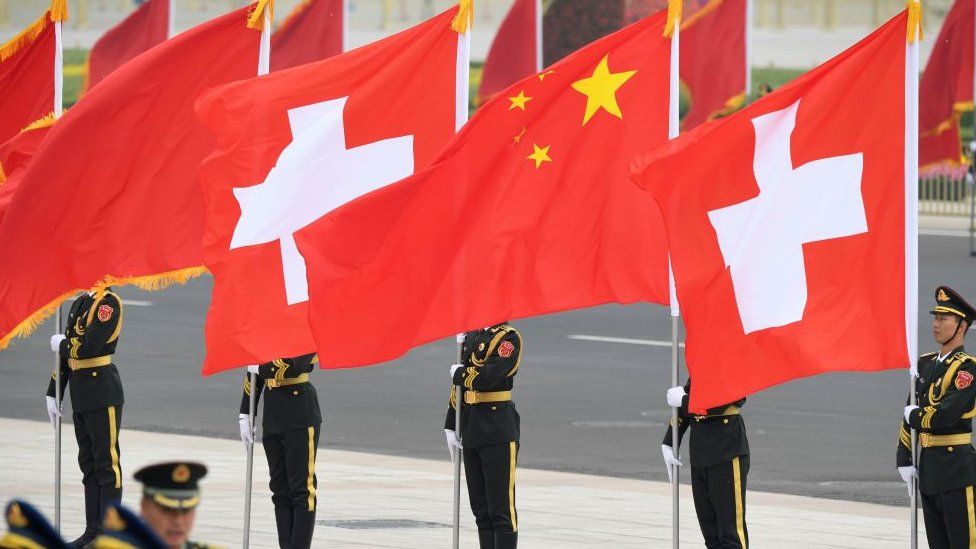lun, Nov 7th 2022
Neutral Switzerland has had a long relationship with China beginning in 1950 when it was the first western country to recognize Communist China as a nation. As China is accused of more human rights violations against Uyghurs, Switzerland is considering following the EU in enacting sanctions against the country.

Swiss President Ignazio Cassis shakes hands with Chinese Foreign Minister Wang Yi after a press conference at the Foreign Ministry in Beijing in 2018.
Relations between China and Switzerland will deteriorate should Switzerland follow in the EU’s footsteps and impose sanctions on the Asian nation, the Chinese ambassador to Bern warned in an interview NZZ am Sonntag.
“Anyone who really cares about the friendly relations between the two countries and who makes responsible policy will not agree to the sanctions,” China’s ambassador Wang Shihting said. “If Switzerland adopts the sanctions and the situation develops in an uncontrolled direction, Sino-Swiss relations will suffer,” he added.

Chinese Ambassador Wang Shihting says relations between the two countries will “suffer” if Switzerland adopts sanctions on the basis that China has violated human rights.
More on the EU sanctions on China
In 2021, members of the EU accused Chinese officials of imprisoning more than one million Uyghurs – a Muslim sect of Chinese residents who make up about half of the population of the northwestern Xinjiang province. Chinese officials in that region have been accused of everything from detaining the Uyghurs in “re-education camps” to committing genocide against them. The Chinese government has responded that “peace and prosperity” has been brought to Xinjiang as a result of its “anti-terrorism measures.”
The EU says China is engaging in human rights abuses and last year it imposed its first sanctions on the country since the 1989 arms embargo following the Tiananmen Square protests.

One Swiss official announced over the summer that Switzerland would enact sanctions against China should it invade Taiwan. China holds that Taiwan is part of the country under its “One China” policy.
Will they or won’t they?
Switzerland and China have had a long-standing relationship since the neutral country was one of the first to recognize Communist China as a nation in 1950. China has been Switzerland’s biggest trading partner in Asia since 2010 and its third biggest trading partner overall. In 2014, the two nations entered into a bilateral free trade agreement which includes a joint program for stocks listings and trading.
However, the Swiss government in recent years has become more outspoken about human rights violations. Swiss President Ignazio Cassis said last year that the country’s more critical perspective on human rights issues would represent a policy shift with its relationship with China. And then on the morning in November 2021 that Cassis was supposed to fly to China to discuss their new path forward, Cassis’s jet had technical difficulties and was grounded in Russia. The two men were forced to have their discussion by phone.
In May, local media reported that discussions over updating Switzerland’s free trade agreement with China stalled in Bern as a result of Switzerland taking a more critical look at China’s human rights record. At that time, Ambassador Shihting denied the rumors, saying “the free trade agreement is economically oriented, human rights are not an issue.”
In July, the State Secretariat for Economic Affairs (SECO) director Marie-Gabrielle Ineichen-Fleisch said she expects neutral Switzerland to adopt EU sanctions against China if the nation were to invade Taiwan.
“However, sanctions in the case of China would be far more drastic (than sanctions against Russia) because the economic relations are much more important,” Ineichen-Fleisch said, adding that “there would probably be greater discussions in the EU and the United States, as well as in Switzerland than there were in Russia. But I hope it will never come to that.”
Switzerland has yet to recognize the Asian island of Taiwan as its own nation, but some government officials have explored a free trade agreement with Taiwan. Ambassador Shihting responded that he “can only emphasize that the one-China principle is the political basis for China having relations with other countries.”
In September, the UN Human Rights Office in Geneva released a report that found “credible evidence” of sexual violence and torture against the Uyghurs. Ambassador Shihting responded to the report saying that it was “based entirely on lies and rumors” and that the “whole thing is an absurd farce funded by the U.S. and Western anti-China forces.”

The U.S. has urged Switzerland to not use Chinese tech company’s Huawei’s products (pictured above), citing that China may be using them to spy on other nations.
Quelle est la suite des événements ?
For now, Switzerland remains silent on whether it will follow in the EU’s footsteps. Over the past few months Swiss parliament members have been discussing ways to reduce the country’s dependency on China. One suggestion has been blocking Chinese mobile tech company Huawei from the Swiss 5G network. U.S. officials have urged Switzerland to make the move, saying that China may be using the 5G network for espionage.
Ambassador Shihting responded that such a move would be considered by China “a political one” and that China opposes the “use of state force to contain Chinese companies.”
Switzerland was quick to adopt EU sanctions against Russia in condemnation of the Russian invasion of Ukraine. Although left-wing members of parliament are calling for Switzerland to do more – for instance, allow exports of ammunition to Germany – right-wing members caution that the sanctions signal that Switzerland is moving away from neutrality. Imposing sanctions on China may be considered another few steps away from its neutral path.
Cet article peut être librement partagé et réimprimé, à condition qu'il renvoie clairement à l'article original.
